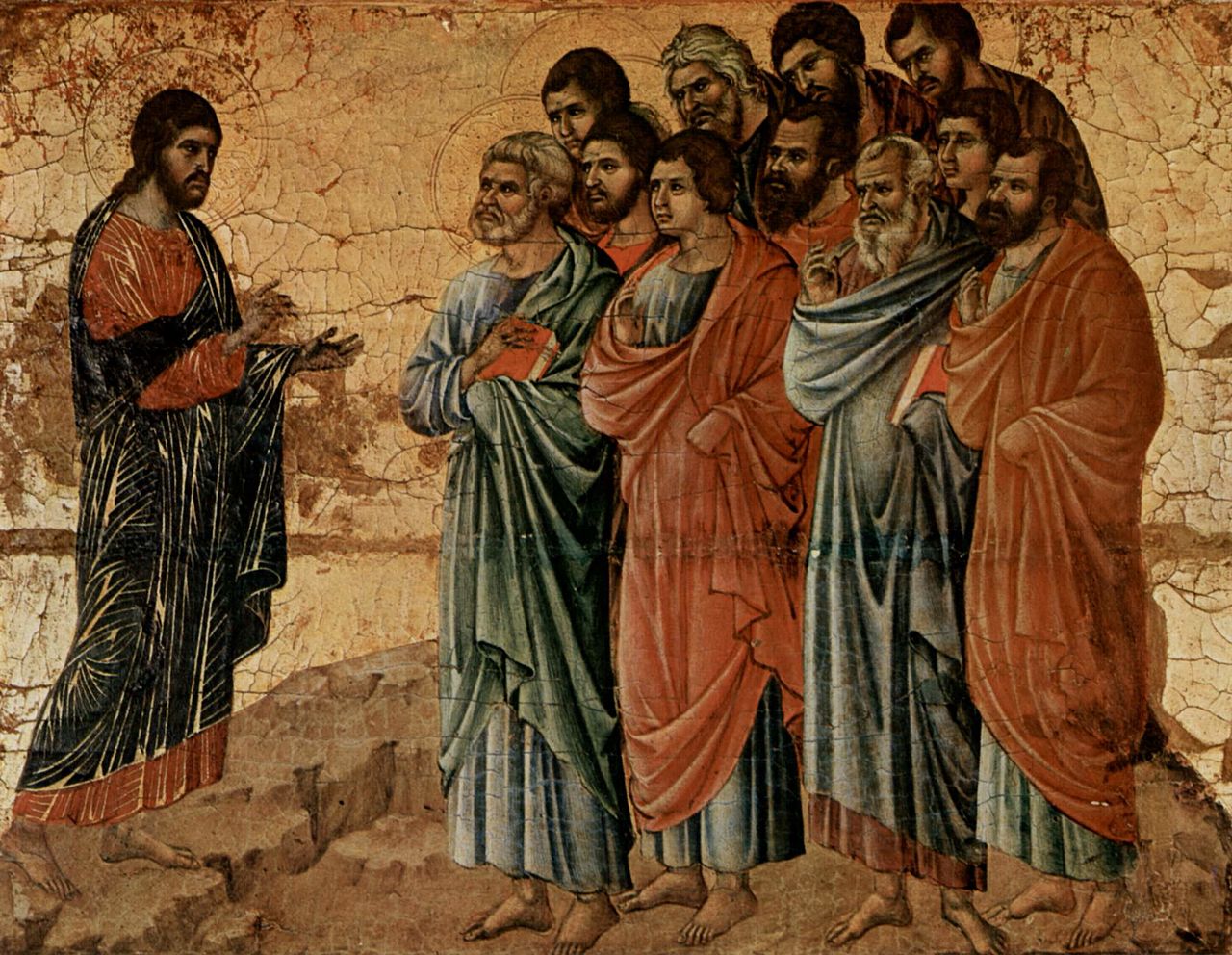Duccio di Buoninsegna (1255–1319): Christ Appears to the Disciples on the Mountain in Galilee
This is Part 1 of a two-part blog post. Part 1 examines the fundamental definition of what it means to “make disciples” from a biblical context. Part 2 examines an interpretive dilemma of “make disciples” due to the grammatical structure of Matthew 28:19-20, as well as provides critical commentary on the popular usage of “disciple-making” and its consequences.
What exactly did Jesus mean when he commanded the apostles to “make disciples” in the great commission?Go, therefore, and make disciples of all the nations, baptizing them in the name of the Father and the Son and the Holy Spirit, teaching them to follow all that I commanded you. (Matthew 28:19-20) (NASB)
Is “make disciples” defined as what happens up to and including conversion, or is it defined as what happens after conversion (baptizing and teaching to follow all Jesus commanded)? Or is it some of both?
To begin answering this question, we must clarify the definition of disciple. For this, we will turn to the gold standard for Greek-English lexicons—the BDAG.1
mathetes (noun)2
1. One who engages in learning through instruction from another (pupil, apprentice)
2. One who is rather constantly associated with someone who has a pedagogical reputation or a particular set of views (disciple, adherent)
Clear enough. But wait—the Greek language not only has the noun mathetes (pupil, disciple), but it also has a verb form for this, which is matheteuo.
matheteuo (verb)3
1. To be a pupil (to be or become a pupil or disciple of someone) (Intransitive: no direct object)
2. To cause one to be a pupil (make a disciple of) (Transitive: with a direct object)
Pretty simple, right? The Greek noun mathetes translates well into English via the noun “pupil” or “disciple.” But the problem we have in English is there is no one-word verb that captures the essence of the Greek verb matheteuo in translation. Matheteuo unfortunately does not translate into English cleanly. For the specific transitive form of the verb that we find in Matthew 28:19 (mathateusate), “make disciples” is the established and generally accepted translation; however, this is problematic because in the Greek the true sense comes from a one-word verb that means “to cause one to be a disciple.”
Perhaps if English had such a one-word verb for “to cause one to be a disciple,” the word would be “pupilize,” or “studentize,” or “disciplize,” as these capture the essence of the noun in a one-word verb form. (The suffix -ize is added to adjectives and nouns to form transitive verbs with the general senses “to render, make….” It means “to cause to be or become…”.)4
In essence, what Jesus is saying in Matthew 28:19 is, “go and cause all the nations to be disciples.” This essence is apparent in light of what the verb matheteuo means. This essence is synonymous with the understanding of “convert” or “win” disciples to Jesus. At some point, one can be said to have been caused to be a disciple, or converted, or won. At some point, one is not a disciple, and then at another point, he is a disciple, or has become a disciple. You probably remember the day you committed to being a disciple of Jesus. Someone caused you to become a disciple through interacting with and teaching you. You made a decision to be a disciple after believing and agreeing to whatever your instructor taught, and then you were a disciple.
The uses of the verb matheteuo in the New Testament should cleanly bear the inherent definitions of to be or become a disciple (intransitive) or to cause one to be a disciple (transitive). Or if not, they should tell us something different about what this verb means or includes in its definition. Apart from Matthew 28:19, here are all the instances of matheteuo in the New Testament:
1. Matthew 13:52:
And Jesus said to them, “Therefore every scribe who has become a disciple (mathēteutheis) of the kingdom of heaven is like a head of a household, who brings out of his treasure new things and old.” (NASB)
2. Matthew 27:57:
Now when it was evening, a rich man from Arimathea came, named Joseph, who himself had also become a disciple (emathēteuthē) of Jesus. (NASB)
3. Acts 14:21:
When they had preached the gospel to that city and had made many disciples, (mathēteusantes) they returned to Lystra and to Iconium and to Antioch.
The contexts of all these passages clearly show that the thrust of the meaning of the verb is “to be/become a disciple” or “to cause one to be a disciple,” as the BDAG sets forth. They further show that becoming a disciple or being made into a disciple is something that happens at a specific point in time; it is not something that carries an inclusive meaning of future actions (such as baptism) or into a potentially perpetual future (such as being taught how to follow all the teachings of Jesus). In other words, no one is spoken of in terms of becoming a disciple or being made into a disciple as referring to their continuing discipleship to Jesus where they strive their whole lives to learn and obey everything he commanded. The thrust of meaning is initial conversion into a discipleship relationship with Jesus.
Acts 14:21 is of particular note as it matches the transitive form of “make disciples” that we see in the great commission of Matthew 28:19. No one would think that making disciples here would refer to anything other than initial conversion into discipleship to Jesus. We may assume that these people would have been baptized immediately upon becoming disciples of Jesus (as is the pattern through Acts); however, we would not conceive that they also had been taught to obey everything Jesus had commanded the apostles, and therefore, this would not be inherent in the definition of how one makes a disciple. Context and basic definition show that Luke’s only intention in using this word is to relate to the reader that people had been won over to becoming disciples of Jesus. The gospel writers do not use matheteuo other than to refer to initial conversion into discipleship to Jesus.
Synonymous to the usage of matheteuo in the New Testament is the usage of poieó (do, make)4 in the context of making disciples:
1. John 4:1:
Now when Jesus learned that the Pharisees had heard that Jesus was making and baptizing more disciples than John…
Iēsous (Jesus) – pleionas (more) – mathētas (disciples) – poiei (makes) – kai (and) – baptizei (baptizes)
2. Acts 26:28:
King Agrippa, do you believe the prophets? I know that you believe.” And Agrippa said to Paul, “In a short time would you persuade me to be (poiēsai) a Christian?”
John 4:1 is extremely significant because it contains the concepts of the great commission; however, it uses a different verb for making disciples. John uses poiei to convey the meaning of “making” disciples. It refers to Jesus winning disciples after himself, or signing up people to follow him as his disciple, synonymous to what we know of matheteuo. He was “making and baptizing more disciples…”; it is important to note that John presents “making” and “baptizing” as two separate concepts. Making a disciple did not mean baptizing a disciple. Nor did baptizing a disciple refer to how you make a disciple. Who got baptized? Those who joined up as Jesus’ disciples. Jesus first convinced people to follow him as his disciples, and then he baptized them. There was a specific point in time when they became his disciples, and then they were baptized. And as his baptized disciples, they would then spend the rest of their foreseeable lives learning to follow all Jesus taught, or at this moment, what he had taught to that point and would teach through the rest of his earthly ministry. This is Matthew 28:19-20 lived out in the actual personal ministry of Jesus. The great commission was merely Jesus’ call and command to his disciples to do what he had done. Jesus made disciples, baptized them, and raised them up (conversion, justification, sanctification). We must understand and interpret the great commission in this context, as this is its theological foundation.
One other concept to understand here is that baptism, or the point in time when God does the work of salvation in the forgiveness of sins for the believer (Colossians 2:11-14), is not an inherent part of the meaning of becoming a disciple of Jesus. Anyone can become a disciple of any teacher, including Jesus, regardless of whether the teacher has a teaching on salvation or not. While Jesus has a teaching on salvation that would likely cause people to want to follow him, the teaching of receiving salvation should not be conflated with the teaching of becoming his disciple, as if they are the same thing. We follow a master teacher who has a teaching on salvation that he commands we obey. This is why, upon being won over to becoming Jesus’ disciple, people are then baptized. Jesus has special blessings for those who become his disciples which include their justification (in baptism) and sanctification (through learning to obey all he has commanded).
Acts 26:28 is also very significant because it depicts Paul trying to persuade King Agrippa to become a disciple, and King Agrippa knows it:
King Agrippa, do you believe the Prophets? I know that you believe.” 28 Agrippa replied to Paul, “In a short time you are going to persuade me to make a Christian of myself.” 29 And Paul said, “I would wish to God that even in a short or long time not only you, but also all who hear me this day would become such as I myself am, except for these chains.” (Acts 26:27-29) (NASB)
This shows once again the single concept that making a disciple in a biblical context refers to initial conversion into a discipleship relationship with Jesus. It also shows that Luke is comfortable in using either matheteuo or poieó to describe the action of initial conversion, or becoming a disciple of Jesus.
After seeing all the instances of matheteuo and its contextual meaning (as well as the same concept using poieó), should we expect anything different when we read Matthew 28:19?
Matthew 28:19:
Go, therefore, and make disciples (mathēteusate) of all the nations….
Per what we have seen above, we would expect this instance of matheteuo in Matthew 28:19 to carry the same meaning as how Matthew used it twice previously, how Luke used it in Acts, and how John uses the concept of making disciples but with the verb poieó. In fact, with the BDAG’s definition and all the uses in the New Testament, not to ascribe it the same meaning would be to misrepresent it grossly.
“Make disciples” clearly means to convert people to following Jesus as his disciples. It does not carry any other range of meaning other than what happens through the point of conversion into a discipleship relationship with Jesus, i.e., becoming his disciple.
However, an interpretive dilemma exists with “make disciples” in Matthew 28:19. The issue pertains to the Greek grammatical structure, whether “make disciples” includes in its definition the actions of baptizing people and teaching them to obey everything Jesus commanded. At stake is clarity in the great commission of Jesus, including the language we use to teach and describe it, which in turn creates an entire church culture. Also at stake is conviction in obedience to the work of evangelism-conversion as well as in raising up new converts. How we teach and talk about these two concepts has huge implications for how the church fulfills its mission.
In Part 2, we will examine what is going on with “make disciples” in Matthew 28:19, and where the idea comes from that it inherently includes in its definition the concepts of baptizing people and teaching them to obey everything Jesus commanded.
References
| ↑1 | Danker, Frederick W., Walter Bauer, William F. Arndt, and F. Wilbur Gingrich. A Greek-English Lexicon of the New Testament and Other Early Christian Literature. 3rd ed. Chicago: University of Chicago Press, 2000. (https://www.amazon.com/Greek-English-Lexicon-Testament-Christian-Literature/dp/0226039331) |
|---|---|
| ↑2 | BDAG, s.v. “μαθητής.” |
| ↑3 | BDAG, s.v. “μαθητεύω.” 4 BDAG, s.v. “ποιέω.” |
| ↑4 | https://www.collinsdictionary.com/us/dictionary/english/izeDictionary.com. Accessed 6 Jul. 2022. |



